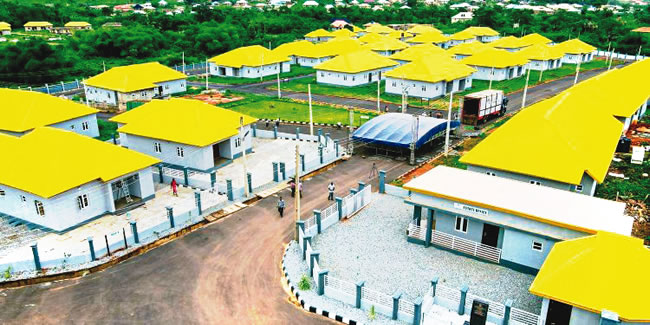[ad_1]
Having identified its critical role as one of the tools to address the prevailing urban insecurity in Nigeria, settlement experts, under the auspices of the Nigerian Institute of Town Planners (NITP), have called on the government at all levels to demonstrate political will to implement physical development plans for cities and urban areas in the country.
Such political will, they said, has become imperative to implement physical development plans, as well as other strategies and tools that could curtail crime.
Rising from their 53rd National Conference/Annual General Meeting in Abuja, themed, ‘Physical Planning and Urban Security in Nigeria: Issues, Challenges and Prospects,’ the experts implored government at the federal level to implement the extant Nigerian Urban and Regional Planning Act LFN 2004 while urging states to domesticate the law without further delay.
In addition, they urged that governments at all levels should prepare and implement appropriate physical development plans for urban areas to serve and promote orderly human settlements in accordance with Goal 11 of Sustainable Development Goals (SDGs).
To curltail urban insecurity, the experts said, smart security measures should be adopted to complement existing security framework, adding that policies on security must be community-driven for effective implementation.
“There is the need to minimise car-centric policies and promote walkability. Such a tendency discourages crime since it promotes interaction and familiarisation.
“Modern technology in crime prevention such as GIS and Remote Sensing, should be adopted to determine crime hotspots that could help in policing and patrol of crime areas within city neighbourhoods,” the experts suggested.
According to them, smart building concepts, efficient street lighting, street naming, house numbering, CCTV, among others, should be encouraged in Nigerian urban centres.
They also urged that Crime Prevention Through Environmental Design (CPTED) should be adopted to dissuade criminals and reduce opportunities for crime.
“Policies and regulations that will set out design standards to mitigate urban crime should be enacted. Security agencies should be reformed and empowered financially for improved service delivery. Community policing should be adopted to improve the security situation at community level,” the town planners noted.
These were contained in a communique issued at the end of the conference, which was signed by the institute’s National Publicity Relations Secretary, Dr David Olawale.
According to them, existing slum and blighted communities should be upgraded to reduce proliferation of hideouts for criminals, while religious and traditional institutions’ codes of conduct in crime management should be re-enacted, noting that penalties from such institutions usually attract deep public condemnation.
“Societal norms and values should be reinforced in our communities to enforce penalties on criminals and deviants. Cities should be properly delineated to curb urban sprawl that has the tendency to increase vulnerability to crime,” the communique read.
One of the highlights of the annual conference was the induction of 319 new members and the admission of six selected individuals into the honorary membership category of the institute.
Chairman of NITP, FCT Chapter, Mustapha Mubdiyu, while welcoming participants, urged them to explore the opportunities offered by Abuja as a role model in city development. The outgoing National President of the institute, Olutoyin Ayinde, appealed to conferees to pay attention to the resources that would be delivered.
Goodwill messages were presented by several eminent persons, including the Minister of Works and Housing, Mr Babatunde Raji Fashola; representatives of nine state governors; presidents of professional associations and the regulatory body of town planners, the Town Planners Registration Council of Nigeria (TOPREC).
Keynote address was delivered by the Governor of Taraba State, Darius D. Ishaku, while the conference was declared open by the Past President and Chairman, Board of Trustees and Chairman, College of Fellows of NITP, Chief D.C Obialo.
The conference observed that lack of commitment to physical planning of human settlements by the government was a key factor to the security challenge in Nigeria.
“There is a lack of political will by the government at all levels to implement physical development plans even where they exist,” the communique read.
ALSO READ FROM NIGERIAN TRIBUNE
The conference listed unemployment, militancy, terrorism, failure of political leadership, poor security system, loss of societal values, poor conditions of living and lack of basic infrastructure facilities as major causes of urban insecurity in Nigeria.
According to the settlement experts, population explosion, without planning and adequate infrastructure has, led to slum development and insecurity, adding that rapid urbanisation of Nigerian cities without adequate employment opportunities and infrastructure contributed to higher vulnerability of citizens to insecurity.
They noted that violence and urban crime were mostly experienced at Central Business Districts (CBDs) and suburban locations, pointing out that poor implementation of physical development plans would negatively shape the urban environment and consequently increase security threats to citizens and put properties at risk.
They also observed that, “There is lack of synergy amongst conventional community-based security groups in Nigerian urban areas,” explaining that effective development control, application of technology, urban renewal and crime prevention through environmental design are major tools to prevent and reduce crimes in urban areas.
[ad_2]








